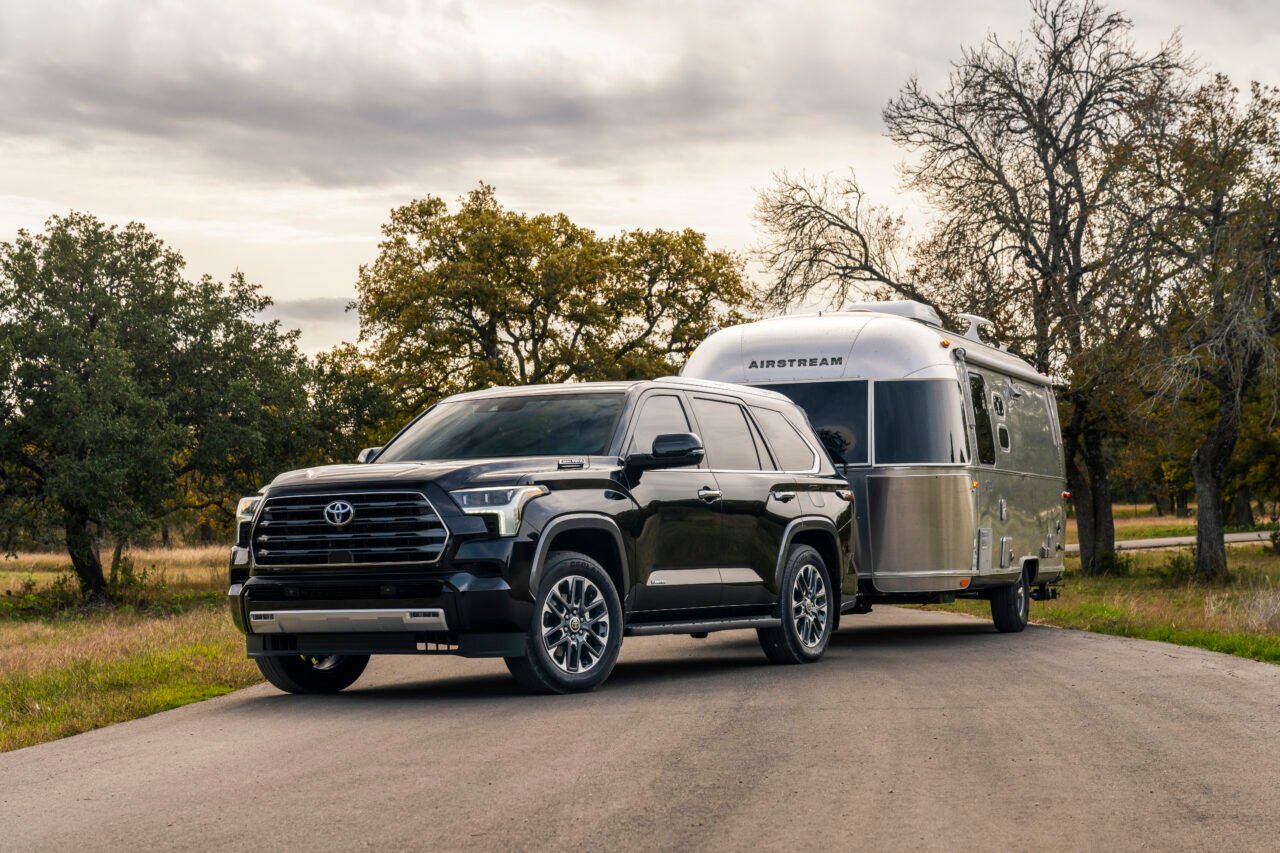Does Premium Gas Help When Towing? 7 Crucial Questions Answered!
Whether or not the type of gas used will make your vehicle tow better is a highly contested question in the industry.
Premium gas is the ideal fuel for heavy-duty vehicles. Also, high-performance engines often see the benefit of using premium gas, but what about towing.

So, does premium gas help when towing? Let’s find out.
Does Premium Gas Help When Towing?
Premium gas helps to enhance the efficiency and performance of the vehicle, but it doesn’t help your vehicle when towing. Your maximum towing capacity will remain as stipulated on the owner’s manual whether you are running on regular or premium gas.
When it comes to towing, the engine plays a huge role. For optimum running of the engine, ensure you use the best gas.
Premium gas has a high octane and thus it is the most recommended type of gas for high-performance applications.
If you are towing a small camper or a boat to your adventure destination, you will want the process to be smooth and easy.
Both regular gas and premium gas engine will offer you great towing capacity. Does premium gas help when towing compared to regular gas? The difference is very little.
Other factors like the general condition of other components in the vehicle will also come to play here.
Is there any benefit to using premium gas?
High octane fuels with octane levels of 91 or higher are usually used on vehicles that offer high performance and handle heavy-duty applications.
Towing is among the heavy-duty chores of such engines that require high-quality premium fuel.
When a vehicle is pulling a trailer or a camper, it is doing extra work. Hauling such weights will demand extra effort from the engine.
Using high octane premium gas will enhance the performance and mileage and even cut carbon emissions.
However, if your vehicle’s engine isn’t designed to use premium gas, you will not notice any significant difference, and neither will you get any benefit from using premium gas.
So, the answer to “Does premium gas help when towing?” dependes on which kind of gas your engine takes.
Every vehicle model comes with a recommended minimum octane need, and you should not use a lower grade gas type.
Understanding the Octane Ratings
Ideally, the higher the octane rating, the better the high-octane fuel will be at resisting engine knock.
When the engine knocks, it will produce some rattling noise when compressed fuel is ignited too early in the engine.
Regular unleaded octane is rated 91, while mid-grade is 95 and high-grade premium octane is 98.
Pre-ignition tolerance is defined as how much a specific type of fuel may be compressed before ignition without igniting.
When fuel is compressed more before combustion, it will provide more power.
Regular octane fuel is recommended for most vehicles. If you’re not sure what kind of fuel your vehicle should use, consult the user manual.
The octane level that is best for towing is a popular question whose answer will depend on many other variables affecting your vehicle’s performance.
It’s normal for an engine to have some knock while it’s running at full power.
Pinging can be heard when towing a camper or a boat, especially in rugged or steep terrain. This is caused by the high pressure in the engine’s cylinders. Does premium gas help when towing and there’s pinging? Using premium doesn’t necessarily change this.
However, engine knock that persists can be damaging. Gasoline-injected engines will simply adapt themselves for driving and heavy-duty applications, maximizing the amount of petrol you can get out of your tank.
Therefore, the best fuel to use when towing is one that is up higher in octane number. As a general guideline, use the octane grade recommended by the automaker.
Even if premium gas will enhance the efficiency of your engine, and by extension the towing capacity, it is not always cost-effective.
Using higher octane fuel is advisable only when you experience excessive knocking.
It is not always the gas that could be causing the engine to squeak or ping.
It could also be due to some other engine issue that has to be addressed. Ensure your vehicle has undergone its routine maintenance to eliminate other sources of faults.
Ignition timing and exhaust gas recirculation will sometimes cause similar noise from your engine. Consider using higher octane gas when towing won’t harm your engine, and if knocking stops.

Frequently Asked Questions (FAQs)
Does premium gas help when Towing With acceleration?
Vehicles running on premium gas will exhibit better performance and higher efficiency compared to those running on regular gas.
Because of this, vehicles running on gas will accelerate a few milliseconds faster than their regular gas counterpart.
The high-octane level on premium gas delays the burning of the fuel and allows it to attain higher compressions and temperatures in the engine.
All this translates into efficient handling and speeds on the road. So, does premium gas help when towing with acceleration? It could, depending on the engine.
Can ethanol-enriched gas affect my towing?
Ethanol-rich gas can affect your towing experience. Ethanol is usually added so as to minimize air pollution.
Your towing vehicle will use more gas for every mile traveled.
With 10 percent ethanol, you will experience a slight loss in fuel efficiency and hence the overall performance of the vehicle.
What fuel is best for towing?
Diesel engines deliver torque at lower engine rpm, making them more powerful than gasoline engines.
As a result, diesel engines are better suited for towing, as they are more responsive. But what about premium gas?
Both premium fuel and regular fuel will provide excellent towing in your vehicle.
Before you embark on heavy duty or high-performance tasks like towing, it is important to check the manufacturer-recommended fuel on your owner’s manual.
Premium gas will give you better efficiency and performance when towing. But this doesn’t mean that only premium gas is suitable for towing.
If your vehicle is designed to use regular gas but still achieve the maximum towing capacity indicated, it means that the regular gas suffices.
Upgrading your octane level will show a significant increase in the efficiency of your vehicle when towing your cargo.
Your engine will work better when running on higher octane fuel.
But this doesn’t translate into increased performance for other vehicle models.
If your owner’s manual states that your vehicle doesn’t require premium fuel, but that it will perform better when running on high octane fuel, then you have the freedom to choose the fuel to use.
Using a different fuel for a few occasions will not harm your engine.
However, continuous use of the wrong fuel when towing will harm your engine in the long run.
Always ensure you revert to the manufacturer’s recommended design fuel after a few runs.
Premium gas has a higher price tag than regular fuel. Therefore, when you must use premium fuel, ensure the application is necessary and that you are getting the value for your money.
That small reduction in carbon dioxide emissions and gasoline use is very important to motorists and the environment.
Should you use premium gas when towing?
As discussed above, premium gas will offer a slight advantage in terms of the efficiency of running the engine and performance when towing.
Towing requires a huge amount of torque and overall horsepower.
When an engine is running efficiently, it will easily provide the necessary energy required to haul your cargo.
Closing Thoughts On Does Premium Gas Help When Towing?
However, this is subject to the manufacturer’s recommendation. Before you fill up your tank in preparation for towing, check your owner’s manual for the minimum octane level stipulated by the manufacturer.
This will help guide you to select the right type of fuel to use.
Whether you are hauling people or cargo, a great amount of power will be required.
Filling up your tank with premium gas will help the engine work better to achieve this.
Occasionally, even while using the recommended octane rating fuel, a vehicle’s engine may knock. Switching to the next highest octane grade is a great option.
If your engine doesn’t show any significant improvement, then you may have to check other engine components for faults.
Upgrading the fuel type used on your vehicle will eliminate knocking.
After the problem has been fixed, you can resume using the vehicle’s recommended octane.
It’s always an issue of whether the additional expenses of premium fuel justify it.
